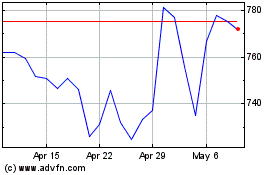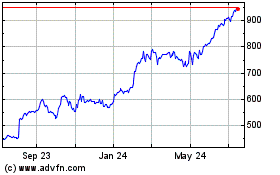By Peter Loftus
Eli Lilly & Co. said its antibody-based drug prevented
Covid-19 among many residents and staff of nursing homes and
assisted-living facilities, results that point to the drug
complementing vaccines while inoculations increase.
The drug, called bamlanivimab, reduced the risk of both staff
and residents getting sick with Covid-19 by about 57% compared with
a placebo eight weeks after receiving doses, Lilly said Thursday.
The effect was more pronounced among residents, the company said,
an 80% reduction in risk of Covid-19.
The findings signal the potential for a new preventive weapon
that could augment the fledgling Covid-19 vaccination effort to
stem the pandemic.
Lilly said it would ask U.S. health regulators to widen the
drug's authorized use to include protecting people in
long-term-care facilities where someone has recently been diagnosed
with Covid-19.
The partial results were from a last-stage, or Phase 3, study
conducted in partnership with the National Institutes of Health.
Lilly disclosed the data in a news release and said it plans to
publish full results in a peer-reviewed medical journal.
In November, the U.S. Food and Drug Administration authorized
bamlanivimab to treat people already sick with mild to moderate
Covid-19, based on a prior study showing it helped improve symptoms
and kept patients out of the hospital.
Lilly Chief Scientific Officer Daniel Skovronsky said it would
be useful to give bamlanivimab as a preventive measure because not
all long-term-care residents and staff have received the new
Covid-19 vaccines.
"We want to try to get this to people in nursing homes," he said
in an interview. "It's not an alternative for a vaccine. It's for
people who haven't been vaccinated, and there's an outbreak in
their facility -- this could be a last resort."
Nursing homes and other senior-care facilities have been hit
hard by the coronavirus, accounting for a large percentage of
deaths during the pandemic. A Wall Street Journal review found the
facilities were tied to a third of Covid-19 deaths world-wide.
Residents are at risk of exposure because of the congregate
setting, and of severe disease because most are elderly or have
underlying health conditions.
So far, at least 1.9 million Covid-19 vaccine doses have been
administered in long-term-care facilities, according to the U.S.
Centers for Disease Control and Prevention. It estimates there are
about 3 million residents of long-term-care facilities in the U.S.,
each needing two doses of the new vaccines.
Yet hesitancy among facility staff to receive the shots has
slowed the rollout of the vaccines in the facilities, which are
being administered by pharmacy chains CVS Corp. and Walgreens Boots
Alliance Inc.
Lilly started the 5,000-subject study in August in U.S. nursing
homes that had a recently diagnosed case of Covid-19, putting
residents and staff at high risk of exposure. The study is ongoing
and is also testing combining bamlanivimab with another
antibody.
Once a case was diagnosed, other residents and staff were tested
for Covid-19 and offered an intravenous infusion of bamlanivimab.
For people who tested positive, the study also tracked whether
bamlanivimab was effective as a treatment.
The prevention data that Lilly released was from 965 people --
299 residents and 666 staff -- who had tested negative for the
virus at the start of the study.
Among these residents, four people subsequently contracted the
disease and died from it, and all had received a placebo. No
residents who tested negative and received the Lilly drug died from
the disease, Lilly said.
Lilly said side effects of the drug in the new study were
consistent with what was seen in prior studies, with small
percentages experiencing nausea, dizziness and headache.
The federal government has agreed to purchase about 950,000
doses of Lilly's antibody for about $1.2 billion, and to make the
doses free to patients.
The FDA authorized a similar antibody-based treatment from
Regeneron Pharmaceuticals Inc., one that had been given to
then-President Donald Trump for treatment of Covid-19 in
October.
The drugs belong to a class of medicines known as monoclonal
antibodies that are designed in labs to mimic the naturally
occurring antibodies that the immune system produces to fight off
viruses and other foreign invaders.
Lilly developed its drug in collaboration with AbCellera
Biologics Inc., of Vancouver, British Columbia, which isolated
antibodies from a blood sample taken from one of the first
Americans to recover from Covid-19.
Since their authorizations, however, the antibody products
haven't been used to treat sick patients as widely as the companies
or federal health officials had hoped. Some infectious-disease
specialists have cited limited evidence of their effectiveness,
while primary-care doctors sometimes aren't aware of the
option.
About 454,000 doses of Lilly's antibody have been distributed in
the U.S., according to the U.S. Department of Health and Human
Services.
Dr. Skovronsky said he hopes the new treatment results from the
nursing-home study will give doctors more confidence to use the
drug in patients.
Dr. Rajesh Gandhi, an infectious-diseases physician at
Massachusetts General Hospital and Harvard Medical School, said the
results look promising and he looks forward to seeing more details
and published data. "We desperately need effective measures to
prevent and treat Covid-19 outbreaks in congregate settings, even
as we accelerate vaccine rollout," he said.
Dr. Gandhi is one of the co-authors of guidelines issued by the
Infectious Disease Society of America which recommend against the
routine use of bamlanivimab to treat nonhospitalized patients with
Covid-19, citing thin evidence of its benefit. The IDSA guidelines
say the drug is a reasonable treatment option for infected patients
who are high risk of worsening to severe disease. The guidelines
don't currently address use of the drug as a preventive
measure.
Lilly also is developing additional antibody treatments for
Covid-19. The company believes bamlanivimab will still be effective
against the coronavirus variant that has spread in the U.K., but
has less confidence it can work against a different variant
identified in South Africa, Dr. Skovronsky said.
Yet he added that Lilly should be able to develop an antibody
that would work against the South African variant.
Write to Peter Loftus at peter.loftus@wsj.com
(END) Dow Jones Newswires
January 21, 2021 13:36 ET (18:36 GMT)
Copyright (c) 2021 Dow Jones & Company, Inc.
Eli Lilly (NYSE:LLY)
Historical Stock Chart
From Mar 2024 to Apr 2024

Eli Lilly (NYSE:LLY)
Historical Stock Chart
From Apr 2023 to Apr 2024
